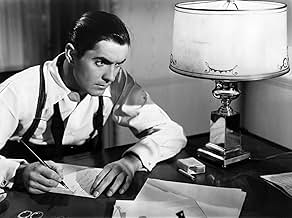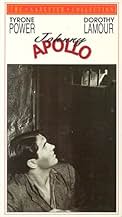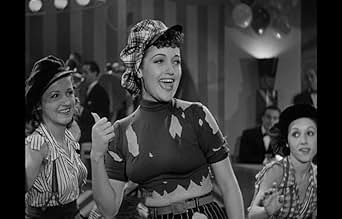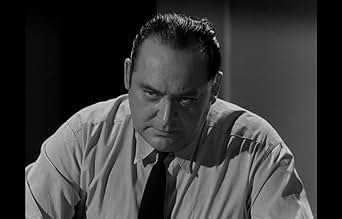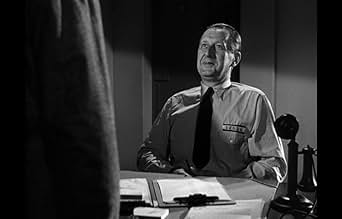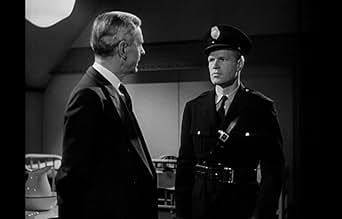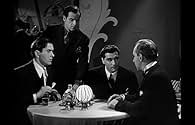Bob est devenu Johnny Appolo, un truand. Sa déviance dans le crime est lié au fait que son père a été arrêté. Lui-même arrêté, il retrouve son père sous les habits d'un gardien de prison.Bob est devenu Johnny Appolo, un truand. Sa déviance dans le crime est lié au fait que son père a été arrêté. Lui-même arrêté, il retrouve son père sous les habits d'un gardien de prison.Bob est devenu Johnny Appolo, un truand. Sa déviance dans le crime est lié au fait que son père a été arrêté. Lui-même arrêté, il retrouve son père sous les habits d'un gardien de prison.
- Réalisation
- Scénario
- Casting principal
- Récompenses
- 2 victoires au total
- Warden
- (as Selmar Jackson)
- Announcer
- (voix)
Avis à la une
One fascinating performance is offered by the underused Charlie Grapewin, perhaps known to the average film goer as Uncle Henry in The Wizard of Oz, or as Grandpa in Grapes of Wrath (Grapewins's most sympathetic and memorable role is as burned-out Jeeter Lester in Jonh Ford's misunderstood Tobacco Road). In Johhny Apollo, Grapewin's take on the burned-out lawyer who takes milk with his Scotch and mumbles Shakespeare when to evade confrontation is both funny and endearing and he becomes a pivotal plot element as the plot thickens.
And thicken it does, with lusty Edward Arnold tossed into jail for embezzlement, and his disowned son, Power, taking up with gangster Lloyd Nolan (always reliable, but here essayed with a nasty undercurrent); much of what Nolan's brutal ganglord does adds a noir element to the film,and a brief scene in a steam bath is right out of Sam Fuller.
Add thug Marc Lawrence from Broadway, Jonathan Hale, reliably a doctor, Fuzzy Knight as a nervous prisoner, and from the Son of Frankenstein, Lionel Atwill, cold and calculating as the lawyer without ethics--until money is dangled his way. The pace never flags, and, except for a short and absurd tagged-on ending that Zanuck probably demanded on behalf of Power fans, the film builds to a dynamic shoot-out in a prison. Not a great classic, but a perfect example of 20th Century Fox machine making a film worth watching.
'Johnny Apollo' turned out to be a well done, fun film with a vast majority of elements executed excellently. If you like any of the actors, good casts and like the type of film it fits under, there is a fairly strong chance of you enjoying 'Johnny Apollo'. It is not a perfect film or one that blows the mind, but there are absolutely no regrets watching it. Quite the contrary and actually thought it was a much needed antidote after a difficult week.
Not everything works. Credibility is strained to the maximum, particularly the final act which also felt a bit too rushed and culminates on a too unrealistically pat and almost sugary note. Arnold's attitude towards his son regarding the crookedness seemed inconsistent and one is not sure as to why.
While the songs are great on their own, don't feel out of place and are beautifully sung by Dorothy Lamour ("They Say" is a hit for good reason, and "This is the Beginning of the End" is especially well sung), they interrupted the flow a bit. Lionel Atwill has far too little to do and struggles to do much with it.
Power however does quite well in an atypical role that required a lot of grit and Power provides that, more than just a handsome face that he was clearly trying to break away from admirably. Actually felt though that the supporting cast were even better, while Dorothy Lamour is an absolute charmer as the female lead the acting honours go to Edward Arnold, as the character who gets my vote as the most interesting, and Lloyd Nolan's unflinching gangster. Enjoyed Charley Grapewin too. The script is taut and has the right amount of suspense and entertainment value.
Henry Hathaway directs with ease and seemed to understand the genre, and the story is suitably hard-boiled and intriguing even if it is not flawlessly executed. The pace is controlled yet generally compelling when the flow is not interrupted. There is some authentic period detail enhanced by the gritty photography and eerie lighting.
In summation, pretty good and recommended though not an essential. 7/10
Power fits the title role of Johnny Apollo rather well. The name is a spur of the moment creation for Robert Cain, Jr. who would be called a trust fund baby today. His widower father Edward Arnold's indictment for some white collar securities violations has put Power's rather well ordered and soft universe to a sudden end.
Power tries to play it straight, but can't make a go of it. Circumstances put him and gangster Lloyd Nolan together. And Power discovers he's got a talent for the rackets. He also attracts the attention of Nolan's girl friend Dorothy Lamour.
Johnny Apollo is a good film with crackerjack performances by the cast that Henry Hathaway directed. It's probably best compared to MGM's Johnny Eager where Louis B. Mayer was also trying to broaden their studio's heartthrob Robert Taylor's appeal. Johnny Eager is the better film, but no one in Johnny Apollo need be ashamed of anything.
Best performances in the film are from Nolan as gangster Mickey Dwyer. Nolan was never bad in any film he was ever in. Second best is alcoholic mob attorney Charley Grapewin.
Dorothy Lamour was brought over from Paramount for this film, playing a part that Alice Faye or Betty Grable might normally have been assigned to. She gets two of her best movie songs to sing, This Is The Beginning Of The End by Mack Gordon and Your Kiss by Frank Loesser and Lionel Newman.
Johnny Apollo is a fine gangster film from a studio that normally did not do that particular genre. At least at this time.
After Power's initial snit over Dad's letting him down, his attempts to secure him an early parole lead, though `connected' shantoozie Dorothy Lamour, to the underworld. The muscles he developed rowing crew in the Ivy League stand him in good stead as muscle in the mob, for soon he becomes a trusted lieutenant in Lloyd Nolan's crime family (plausibility is not the movie's long suit). But Pop (who has reclaimed his spiritual center in the Big House by welding boilers) disowns his namesake when he learns of his new line of work. In due time, of course, Power ends up behind those bars as well. But that's far from the end of the tale....
The plot of Johnny Apollo, a major production, takes a few turns too many but manages to keep a just-passable amount of credibility. Though Power, in the lead, stays less than persuasive as a menacing mobster he's too much of a pretty-boy, and lacks the acting resources to turn himself into a pretty-boy psychopath the rest of the cast compensates. Predictably, Arnold is good, as is, in the role of a mob mouthpiece with a weakness for Scotch-and-milk, Charlie Grapewin (whose first film credit falls in the last year of the 19th Century!); the two seem to be vying for title of America's sweetheart, old-codger division. Best of all is Lamour, with her sad eyes and fetching pout, who leaves an impression here of a skilled actress, more than she managed in all the Hope-Crosby `Road' pictures put together.
Direction is by Henry Hathaway, an uneven craftsman who nonetheless rose to the occasion for a handful of movies; this can be counted among his stronger efforts, along with The Dark Corner, Kiss of Death, Fourteen Hours and Niagara. But Johnny Apollo cleaves more closely to the crime melodramas of the previous decade than to the unsentimental and ambiguous style soon to come. But, in it, one can nonetheless sense particularly in its heavily shaded photography the birth pangs of film noir, struggling to come into the world.
Le saviez-vous
- AnecdotesIn the scene with Johnny and his father talking in the bedroom, the photo over Johnny's shoulder of his mother, is a picture of Tyrone Power's mother.
- GaffesWhen Mickey comes into the judge's offices after the judge has smashed the two whisky bottles, he comments that the room smells like a brewery. It is more likely that the room would smell like a distillery rather than a brewery and Mickey would be aware of the difference.
- Citations
Prisoner Tom Dugan: I steal an empty slot machine and get 10 years, and this guy steals a million and gets 5. Figure that out, will yuh?
Main Reporter: [Sarcastically] That's why you got the 10 - to figure it out.
- ConnexionsFeatured in Les enquêtes de Remington Steele: Cast in Steele (1984)
- Bandes originalesThis Is the Beginning of the End
(1940)
Written by Mack Gordon
Performed by Dorothy Lamour (uncredited) with Harry Rosenthal (uncredited) at piano
Played as background music often
Meilleurs choix
- How long is Johnny Apollo?Alimenté par Alexa
Détails
- Date de sortie
- Pays d’origine
- Langue
- Aussi connu sous le nom de
- Dance with the Devil
- Lieux de tournage
- Sing Sing Penitentiary - 354 Hunter Street, Ossining, New York, États-Unis(exteriors: prison)
- Société de production
- Voir plus de crédits d'entreprise sur IMDbPro
- Durée1 heure 34 minutes
- Couleur
- Rapport de forme
- 1.37 : 1
Contribuer à cette page


